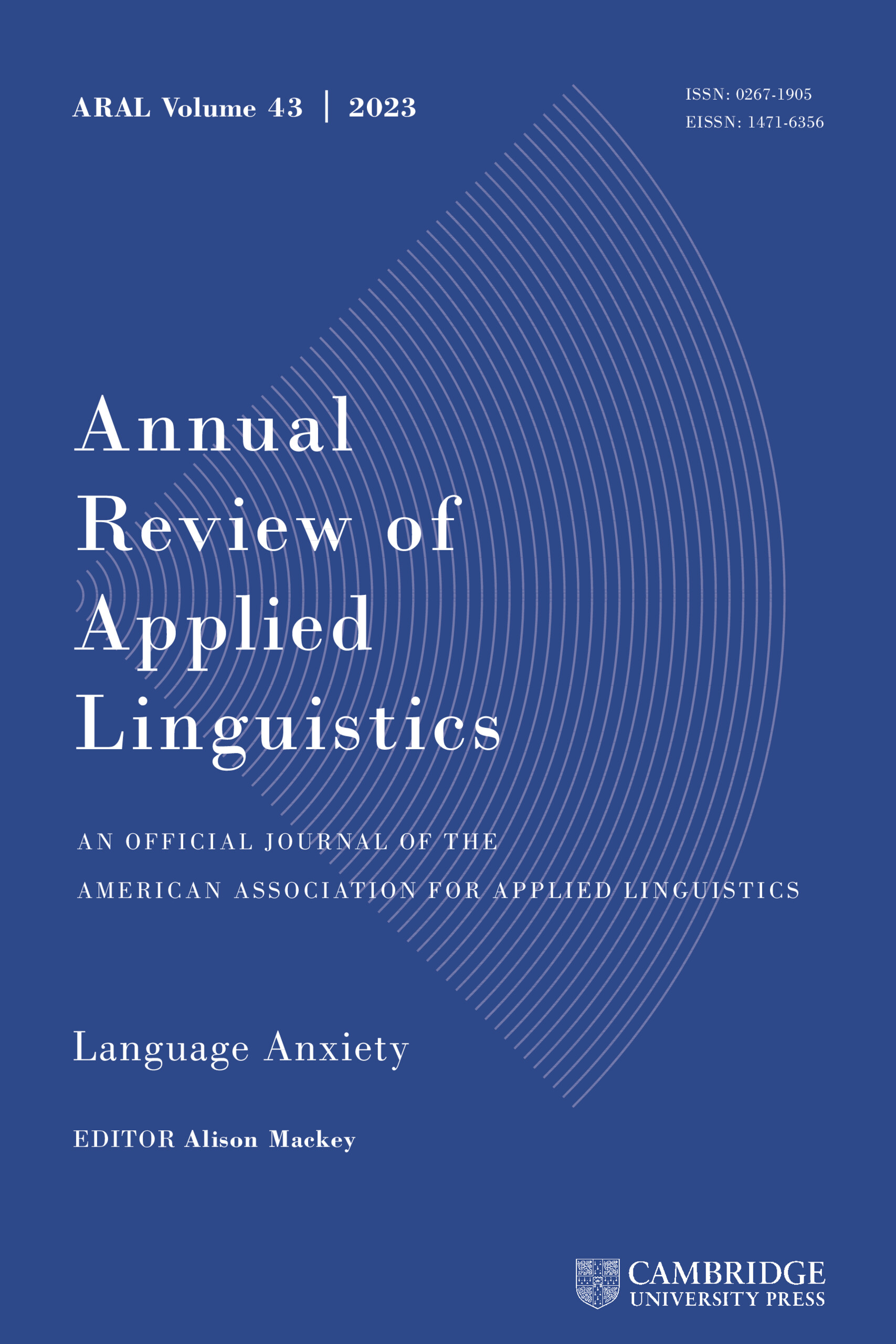Crossref Citations
This article has been cited by the following publications. This list is generated based on data provided by
Crossref.
Patria, Bhina
2012.
Learning environment and graduates' transition period.
International Journal of Research Studies in Education,
Vol. 2,
Issue. 1,
Wright, Clare
2013.
An Investigation of Working Memory Effects on Oral Grammatical Accuracy and Fluency in Producing Questions in English.
TESOL Quarterly,
Vol. 47,
Issue. 2,
p.
352.
Godfrey, LeeAnne
Treacy, Corbin
and
Tarone, Elaine
2014.
Change in French Second Language Writing in Study Abroad and Domestic Contexts.
Foreign Language Annals,
Vol. 47,
Issue. 1,
p.
48.
McManus, Kevin
Mitchell, Rosamond
and
Tracy-Ventura, Nicole
2014.
Understanding insertion and integration in a study abroad context: The case of English-speaking sojourners in France.
Revue française de linguistique appliquée,
Vol. Vol. XIX,
Issue. 2,
p.
97.
Di Silvio, Francesca
Donovan, Anne
and
Malone, Margaret E.
2014.
The Effect of Study Abroad Homestay Placements: Participant Perspectives and Oral Proficiency Gains.
Foreign Language Annals,
Vol. 47,
Issue. 1,
p.
168.
Hardison, Debra M.
2014.
Changes in Second-Language Learners’ Oral Skills and Socio-Affective Profiles Following Study Abroad: A Mixed-Methods Approach.
The Canadian Modern Language Review,
Vol. 70,
Issue. 4,
p.
415.
Roskvist, Annelies
Harvey, Sharon
Corder, Deborah
and
Stacey, Karen
2014.
‘To improve language, you have to mix’: teachers' perceptions of language learning in an overseas immersion environment.
The Language Learning Journal,
Vol. 42,
Issue. 3,
p.
321.
Yang, Jinsuk
and
Rehner, Katherine
2015.
Learner beliefs about sociolinguistic competence: A qualitative case study of four university second language learners.
Language Learning in Higher Education,
Vol. 5,
Issue. 1,
Alcón-Soler, Eva
2015.
Pragmatic learning and study abroad: Effects of instruction and length of stay.
System,
Vol. 48,
Issue. ,
p.
62.
Shiri, Sonia
2015.
Intercultural Communicative Competence Development During and After Language Study Abroad: Insights From Arabic.
Foreign Language Annals,
Vol. 48,
Issue. 4,
p.
541.
Alcón-Soler, Eva
2015.
Instruction and pragmatic change during study abroad email communication.
Innovation in Language Learning and Teaching,
Vol. 9,
Issue. 1,
p.
34.
Briggs, Jessica G.
2015.
Out-of-class language contact and vocabulary gain in a study abroad context.
System,
Vol. 53,
Issue. ,
p.
129.
Henery, Ashlie
2015.
On the development of metapragmatic awareness abroad: two case studies exploring the role of expert-mediation.
Language Awareness,
Vol. 24,
Issue. 4,
p.
316.
Penman, C.
and
Ratz, S.
2015.
A module-based approach to foster and document the intercultural process before and during the residence abroad.
Intercultural Education,
Vol. 26,
Issue. 1,
p.
49.
Félix-Brasdefer, J. César
and
Hasler-Barker, Maria
2015.
Complimenting in Spanish in a short-term study abroad context.
System,
Vol. 48,
Issue. ,
p.
75.
Guo, Lansing Hui
2015.
Intercultural communicative competence, language proficiency, and study abroad.
International Journal of Research Studies in Education,
Vol. 4,
Issue. 2,
Cote, Travis
and
Milliner, Brett
2016.
CALL communities and culture – short papers from EUROCALL 2016.
p.
125.
Van Maele, Jan
Vassilicos, Basil
and
Borghetti, Claudia
2016.
Mobile students’ appraisals of keys to a successful stay abroad experience: hints from the IEREST project.
Language and Intercultural Communication,
Vol. 16,
Issue. 3,
p.
384.
Fernandez, Julieta
and
Gates Tapia, Anna M.
2016.
An appraisal of the Language Contact Profile as a tool to research local engagement in study abroad.
Study Abroad Research in Second Language Acquisition and International Education,
Vol. 1,
Issue. 2,
p.
248.
Kubota, Ryuko
2016.
The social imaginary of study abroad: complexities and contradictions.
The Language Learning Journal,
Vol. 44,
Issue. 3,
p.
347.




